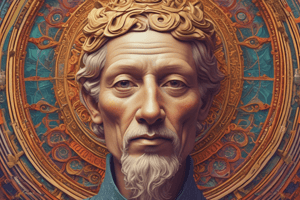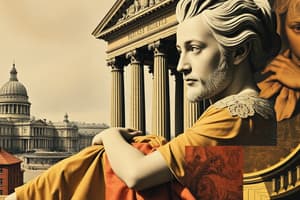Podcast
Questions and Answers
What is The Age of Reason also known as?
What is The Age of Reason also known as?
- The Age of Science
- The Age of Enlightenment (correct)
- The Age of Classicism
- The Age of Rationalism
What were the advances during the Enlightenment?
What were the advances during the Enlightenment?
Science, Philosophy, Government, and the Arts.
Who said, 'The age we live in is a busy age, in which knowledge is rapidly advancing towards perfection'?
Who said, 'The age we live in is a busy age, in which knowledge is rapidly advancing towards perfection'?
Jeremy Bentham
What was the goal of the Encyclopedie?
What was the goal of the Encyclopedie?
Which are considered major themes of the Neoclassical Period?
Which are considered major themes of the Neoclassical Period?
What is Neoclassicism?
What is Neoclassicism?
What does Skepticism maintain?
What does Skepticism maintain?
What is Rationalism?
What is Rationalism?
What is Empiricism?
What is Empiricism?
What is Logic?
What is Logic?
What did philosophers of the Enlightenment Period believe?
What did philosophers of the Enlightenment Period believe?
What is Deism?
What is Deism?
Who were key philosophers of the Enlightenment?
Who were key philosophers of the Enlightenment?
Who is considered an important Enlightenment scientist?
Who is considered an important Enlightenment scientist?
What is epistemology?
What is epistemology?
What is the meaning of 'Cogito ergo sum'?
What is the meaning of 'Cogito ergo sum'?
Who is Voltaire?
Who is Voltaire?
What does Revolution refer to in this context?
What does Revolution refer to in this context?
Who was John Locke?
Who was John Locke?
What worldview dominated Enlightenment thinking regarding order?
What worldview dominated Enlightenment thinking regarding order?
Who was Gotfried Wilhelm Leibniz?
Who was Gotfried Wilhelm Leibniz?
Study Notes
The Age of Reason
- Known as the Age of Enlightenment, the period spans from the late 17th century through the 18th century.
Advances during the Enlightenment
- Significant progress in science, philosophy, government, and the arts.
- Emergence of optimism about rationalism’s benefits for humanity.
- Increased willingness to question traditional authority across various aspects of life.
- Key scientific discoveries made in astronomy, biology, human anatomy, and chemistry.
Key Figures
- Jeremy Bentham, an English philosopher, noted the rapid advancement of knowledge during the age.
Encyclopedie Goals
- Aimed to collect and organize all human knowledge in a single comprehensive work.
Major Themes of the Neoclassical Period
- Primary themes include skepticism, rationalism, empiricism, logic, progress, revolution, order, clarity, deism, and classicism.
Neoclassicism
- An 18th-century artistic movement inspired by Greek and Roman models, emphasizing harmony, balance, and idealized realism while rejecting Baroque excess.
Skepticism
- Originating from Greek philosophy, skepticism asserts that human knowledge is limited and uncertain, endorsing the notion that probable morality is sufficient for ethical action.
Rationalism
- Emphasizes the significance of reason over sensory experience in the acquisition of knowledge.
Empiricism
- Proposes that all knowledge stems from sensory experiences, with Francis Bacon developing the scientific method based on observation and experimentation.
Logic
- Involves structured, step-by-step thinking about ideas and problems.
Enlightenment Philosophers
- Philosophers distanced themselves from religious faith to avoid emotional bias, advocating for logical proofs as the basis for truth.
Deism
- Emerged alongside scientific reasoning, viewing God as the initial creator but not as a direct influencer in human affairs, rooted in rationalism and empiricism.
Prominent Enlightenment Philosophers
- René Descartes (father of modern philosophy), Immanuel Kant (author of "Critique of Pure Reason"), Bishop Berkeley, and David Hume employed rational skepticism in their reasoning.
Enlightenment Scientist
- Sir Isaac Newton introduced modern science, particularly in his work "The Mathematical Principles of Natural Philosophy" detailing the Laws of Motion.
Epistemology
- The branch of philosophy concerned with the study of knowledge and thought processes.
Cogito Ergo Sum
- René Descartes' famous axiom meaning "I think, therefore I am," indicating his rejection of prior knowledge tainted by religious beliefs.
Voltaire
- François Marie Arouet, known as Voltaire, championed science and reason as key to social progress and wrote "Essay on Custom" to document civilization's evolution devoid of nationalistic and religious biases.
Revolution
- Enlightenment principles of reason, individualism, and progress led to significant political and social changes, notably in the U.S. and France, promoting the idea that authority derives from the consent of the governed rather than divine right.
John Locke
- Influential British philosopher whose "Second Treatise of Government" established foundational ideas for democracy and significantly influenced American thought and governance.
Order
- Enlightenment thinking was characterized by the belief in an orderly world governed by a rational Christian God, although some Enlightenment figures proposed a break from Christianity in France post-Revolution.
Gottfried Wilhelm Leibniz
- A significant German mathematician, co-inventor of calculus with Newton, known for his contributions to philosophical logic and rationalist epistemology.
Studying That Suits You
Use AI to generate personalized quizzes and flashcards to suit your learning preferences.
Description
Explore key concepts from the Neoclassical Period and the Enlightenment through these flashcards. This quiz covers important terms and definitions that shaped Western thought in the Age of Reason, highlighting advancements in science, philosophy, and government. Test your knowledge of this transformative era in history!




